Here are words and pictures from our journal from a happier time--at the
Communities Conference (first blogged
here) that took place August 19th-21st.
We got off Hwy 64 near Lousia, Virginia and drove a short way through beautiful wooded countryside. We landed at
Twin Oaks and were greeted by a guy in pigtails and a skirt and were sent to the car-camping ground. We set up and borrowed some bug spray and then made our way along a trail back to the conference area that was cleverly marked with a rope.
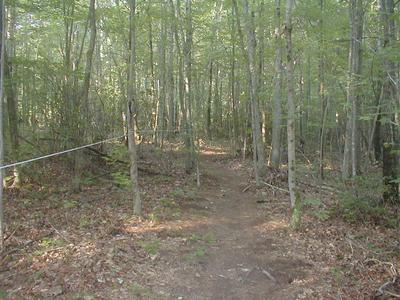
I had to look down to watch for poison ivy as I didn't have on any socks.
We got to the site and registered and started browsing the book booth. I wanted to buy everything in sight while Fay eyed the books about gardens, flowers and produce. I bought five back issues of Communities Magazine.
We milled around for a bit and finally it was time for dinner.
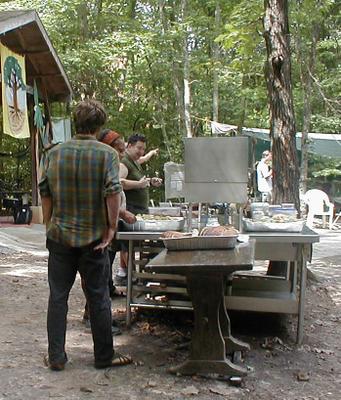
We ate at the least muddy table which turned out to be somewhat removed from everybody else (the picnic tables were arranged in a big circle around the fire pit) but eventually were were joined by Glen and Keith from Jubilee House, a Christian service community that helps war refugees.
After dinner we went to the pavilion for entertainment. We heard an electric piano player, Melody, who said who was a jazzpeace ambassador. Then we heard announcements. Then came the highlight of the evening. A couple (I didn't note their names, unfortunately) led us in a song.
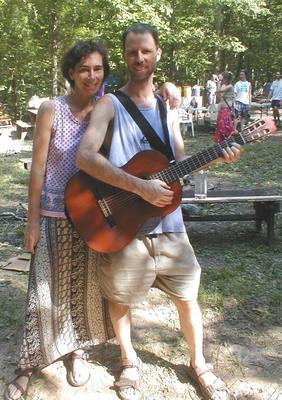
They said was the most frequently sung in America, according to their research. They had us stomping and clapping and lo and behold it turned out to be Queen's "We will, we will rock you!" The leader explained that the lyrics had come to mean "we will kick your ass" so we changed them to "We will build a New World!" It was great fun.
Then it was story telling time and several people stood up and told us stories from their communities. We heard what it was like for the East Wind Community to be covered by National Geographic (yikes!). The funniest part was when he explained that the women "dropped trou" (got nekked) whenever the photographer was around (despite it being October) because the wanted to see whether they would publish a white woman being bare chested. (They did--but doctored the picture to make it look sunny.)
We hiked the trail back to the van and got ready for bed. We were delighted to discover that there were hardly any bugs which was fortunate because it was so hot and we needed to leave the windows and doors open to have at least the appearance of air circulating.
The next morning we got to breakfast before it was over and waited forever for the coffee to percolate. Then it was time for the Opening Circle. If you look really closely under the tree banner you can see someone leading the group in a rousing (considering the hour) rendition of "We come from the mountain."
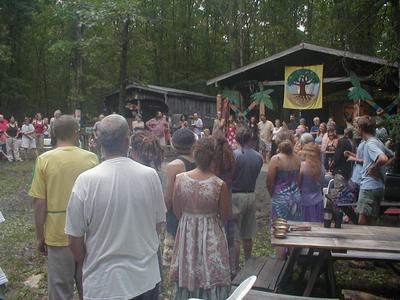
We met the organizers, Valerie and Sky who were really wonderful and did a great job.
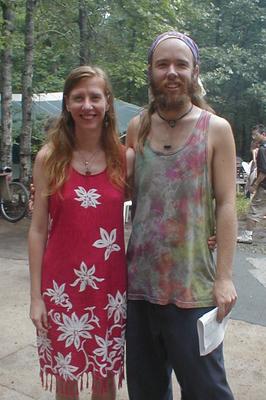
We had announcements and then it was time to "meet the communities." People in communities looking for new members took a minute each to tell a little bit about their group. After that they sat at the picnic tables and we stopped by the ones were were interested in to learn a little bit more. We took pictures of each one to help us remember them.
Eric told us about a community he was starting in northeast Tennessee on 60 acres. He is up there beginning to put in the infrastructure. Its very rustic living when you are first starting out.
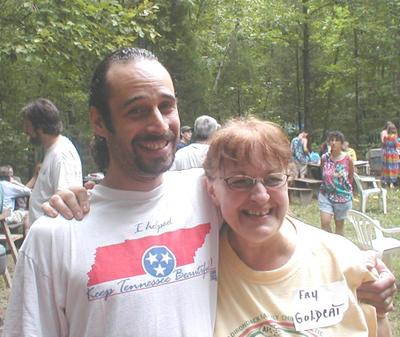
Neo-coho is no longer a cohousing group. Now they want to build and eco hamlet in NE Ohio. They don't have their land yet, but have the area and vision in mind.
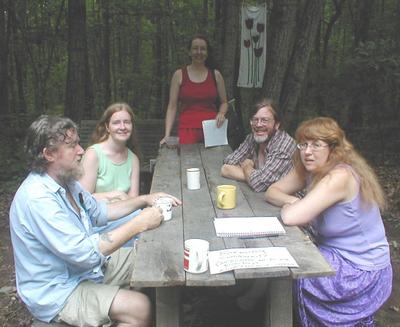
Heathcoate offers natural building courses which Mr. Logan is interested in, so I took a brochure.
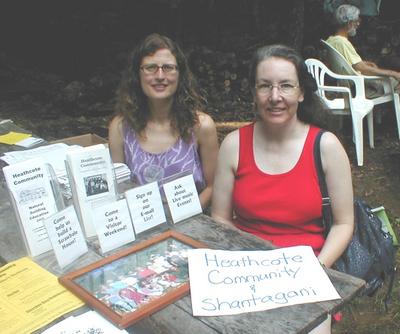
Dunmire Hollow is a small community 2 hours SW of Nashville. Harvey has a woodshop there.
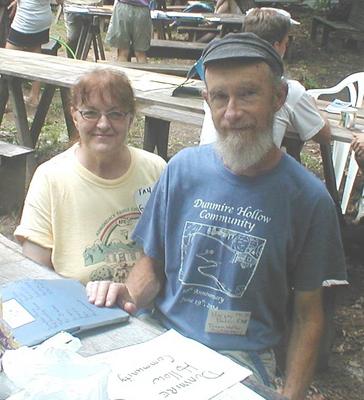
And I had to stop by Dancing Rabbit Ecovillage to see what they thought of their episode of 30 days with Morgan Spurlock (previously blogged here). Our host said that they were pleased overall--it didn't make them look too crazy and it had a lot of information about sustainable living. Compared to other media coverage of intentional communities they felt like they came out on top.
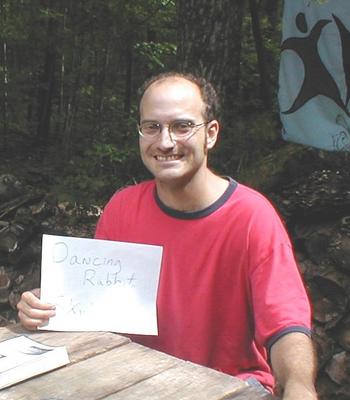
After lunch we had workshops, which I briefly covered in my earlier post on the conference. I went to one on cohousing--it was great, but I left halfway through to take a blessedly cold shower (did I mention it was hot? Later we found out it was about 99 degrees with a heat factor of 110). Then I went to one on visiting communities, a project that is on hold until we find out how severe the gasoline shortage is.
Fay went to a workshop on sustainable agriculture, and learned that shw could control her arch nemesis, kudzu, with grazing animals. (She noticed that the groundhogs liked it. Now on to the goats.)
Before you new it it was time to eat again. We got in the front of the line because we had KP duty after dinner. Everyone washed their own dishes in a series of buckets that were filled up and maintained by the crew:
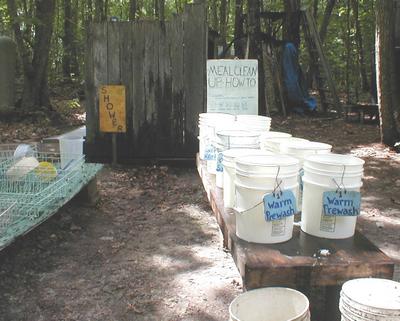
- warm pre-wash
- hot soapy wash
- disinfect w/ clorox
- cool rinse
- put in the rack.
Then we took the dry dishes and stacked them back in the beginning of the food line.
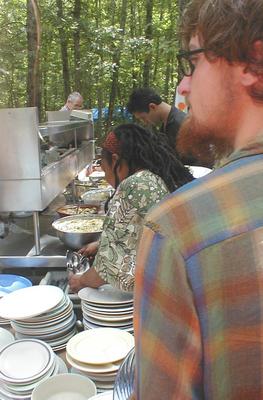
It was tiring work and we were very glad when our shift was over, especially because everybody had gone to a dessert party over at the community building at Twin Oaks. But to get there we had to walk half a mile down a dark path with Lions and Tigers and Bears (and frogs). After two false starts, one leading to the kids' area and one to an outhouse (the lights on the path fooled us), we finally got on the right one, and with one shared flashlight between us we made our way.
We came int though an industrial sized kitchen
 to the buffet where there was a huge spread of cakes and cookies and brownies. The cake was perfection (it was a leftover from a wedding that day) with a lot of delicious frosting. We were not moderate.
to the buffet where there was a huge spread of cakes and cookies and brownies. The cake was perfection (it was a leftover from a wedding that day) with a lot of delicious frosting. We were not moderate.
We read all of the signs, bulletins, and clipboards to get a tiny peek at the life at an income-sharing community. It was organized chaos. I guess your Mom really doesn't live here. But they had a nice selection of publications in their library. That is one great benefit of community living, shared cost of magazine subscriptions.
Then a Klezmer band started up in the hall
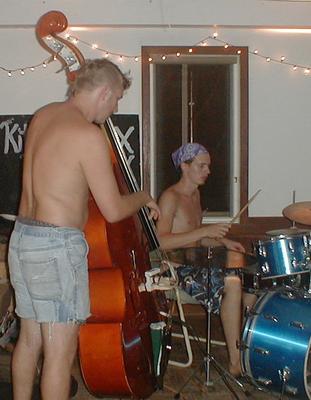

and soon the room filled with dancing people.
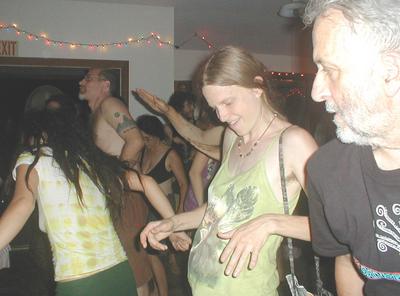
We were to tired to do much hopping around and as soon as we found out there was a shuttle going back to the campground we were on it. We even got a ride to our van.
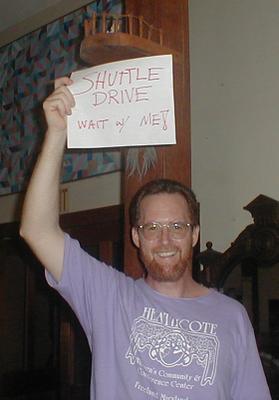
I slept in the next morning but made it in time to get the last pancake. Fay and I sat and talked and missed a group process called Open Spaces that I have since researched and can't wait to participate in. Nevertheless we tood advantage of the work they did setting and agenda and organizing sessions and went to workshops on building the local economy and culture, and natural building.
After lunch it was time for previously scheduled workshops again. I was torn between one called "Creating a healing culture in community" and "Conflict: fight, flight or opportunity?" I opted for the conflict one, in part because I had taught a course in conflict last year and was curious how this would compare to it. It was very good.
Then it was time for the closing circle. We had acknowledgements again, a few announcements, and then we were asked to close our eyes and review the weekend and come up with a word to sum it up. Then we went around the great circle and shared them. My word was "hope" and Fay's were "coming out of my shell." Other funny words included: "air conditioning is wonderful," "sweat," and "hmmm..."
We danced our good-byes.
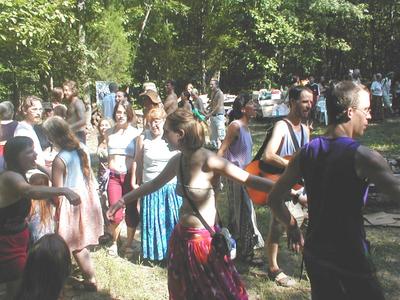 I was sad to go. I really enjoyed the special feeling of being with other people with the same values and dreams for saving (or at least surviving) the world through cooperative living. If you get a chance to go to a retreat with like minded people I highly recommend it. We need that support and revitalization.
I was sad to go. I really enjoyed the special feeling of being with other people with the same values and dreams for saving (or at least surviving) the world through cooperative living. If you get a chance to go to a retreat with like minded people I highly recommend it. We need that support and revitalization.















 to the buffet where there was a huge spread of cakes and cookies and brownies. The cake was perfection (it was a leftover from a wedding that day) with a lot of delicious frosting. We were not moderate.
to the buffet where there was a huge spread of cakes and cookies and brownies. The cake was perfection (it was a leftover from a wedding that day) with a lot of delicious frosting. We were not moderate.



 I was sad to go. I really enjoyed the special feeling of being with other people with the same values and dreams for saving (or at least surviving) the world through cooperative living. If you get a chance to go to a retreat with like minded people I highly recommend it. We need that support and revitalization.
I was sad to go. I really enjoyed the special feeling of being with other people with the same values and dreams for saving (or at least surviving) the world through cooperative living. If you get a chance to go to a retreat with like minded people I highly recommend it. We need that support and revitalization.